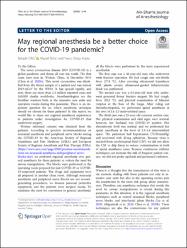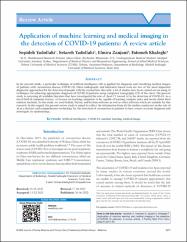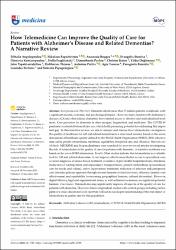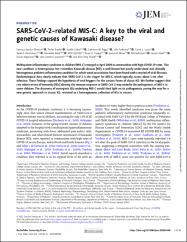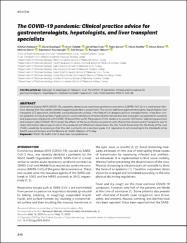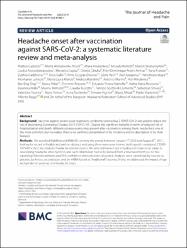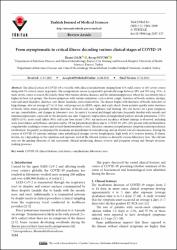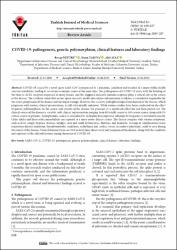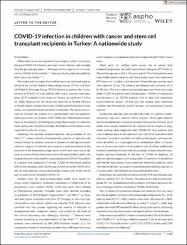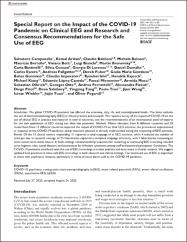Ara
Toplam kayıt 12, listelenen: 1-10
May regional anesthesia be a better choice for the COVID-19 pandemic?
(Springer, 2020)
To the Editor; The novel coronavirus disease 2019 (COVID-19) is a global pandemic and threat all over the world. The first cases were seen in, Wuhan, China, in December 2019 (Chen et al. 2020a). This novel coronavirus was ...
Application of machine learning and medical imaging in the detection of COVID-19 patients: A review article
(Wolters Kluwer Medknow Publications, 2022)
In the present study, a particular technique of artificial intelligence (AI) is applied for diagnosis and classifying medical images of patients with coronavirus disease (COVID-19). Chest radiography and laboratory-based ...
How telemedicine can improve the quality of care for patients with alzheimer’s disease and related dementias? A narrative review
(MDPI, 2022)
Background and Objectives: Dementia affects more than 55 million patients worldwide, with a significant societal, economic, and psychological impact. However, many patients with Alzheimer’s disease (AD) and other related ...
SARS-CoV-2-related MIS-C: A key to the viral and genetic causes of kawasaki disease?
(Rockefeller University Press, 2021)
Multisystem inflammatory syndrome in children (MIS-C) emerged in April 2020 in communities with high COVID-19 rates. This new condition is heterogenous but resembles Kawasaki disease (KD), a well-known but poorly understood ...
The COVID-19 pandemic: Clinical practice advice for gastroenterologists, hepatologists, and liver transplant specialists
(AVES, 2020)
Coronavirus disease 2019 (COVID-19), caused by severe acute respiratory syndrome coronavirus 2 (SARS-CoV-2), is a novel acute infectious disease that has rapidly reached staggering pandemic proportions. This review addresses ...
Headache onset after vaccination against SARS-CoV-2: A systematic literature review and meta-analysis
(BMC, 2022)
Background Vaccines against severe acute respiratory syndrome coronavirus 2 (SARS-CoV-2) are used to reduce the risk of developing Coronavirus Disease 2019 (COVID-19). Despite the significant benefits in terms of reduced ...
From asymptomatic to critical illness: Decoding various clinical stages of COVID-19
(The Scientific and Technological Research Council of Turkey, 2021)
The clinical course of COVID-19 is variable, with clinical manifestation ranging from 81% mild course to 14% severe course along with 5% critical course in patients. The asymptomatic course is reported to potentially range ...
Covid-19: Pathogenesis, genetic polymorphism, clinical features and laboratory findings
(TUBITAK Scientific & Technological Research Council of Turkey, 2020)
COVID-19 caused by a novel agent SARS-CoV-2 progressed to a pandemic condition and resulted in a major public health concern worldwide, leading to social and economic issues at the same time. The pathogenesis of COVID-19 ...
COVID-19 infection in children with cancer and stem cell transplant recipients in Turkey: A nationwide study
(Wiley, 2021)
To the Editor: Adults with cancer are reported to have a higher risk for coronavirus disease (COVID-19) infection and more severe disease and mortality than the general population.1, 2 Although children seem to be at a ...
Special report on the impact of the COVID-19 pandemic on clinical EEG and research and consensus recommendations for the safe use of EEG
(SAGE Publications Inc, 2021)
Introduction. The global COVID-19 pandemic has affected the economy, daily life, and mental/physical health. The latter includes the use of electroencephalography (EEG) in clinical practice and research. We report a survey ...

